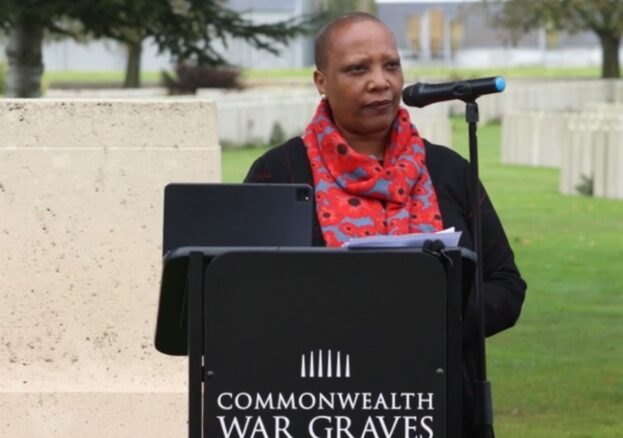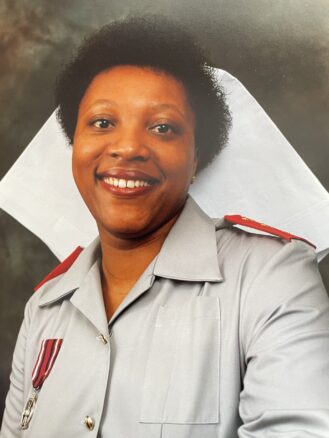
Born in 1962, Sue’s father hailed from Nevis and her mother from Jamaica, both part of the Windrush generation who responded to the UK’s call to help rebuild the nation after the Second World War. Her father initially came to the UK for National Service but chose to remain in the Royal Air Force, dedicating his life to military service, a decision that profoundly influenced Sue’s upbringing.
Reflecting on her childhood, Sue emphasises the strong family values her parents instilled in her and her siblings. “We always had a close family unit,” she recalls.
 Her father’s wisdom was a guiding light, “look, Sue, when you step out in the world, people are going to make a judgment based on your colour and your gender. They’re not going to see your amazingness, your brightness first.” This reality shaped Sue’s understanding of the world and fuelled her determination to succeed.
Her father’s wisdom was a guiding light, “look, Sue, when you step out in the world, people are going to make a judgment based on your colour and your gender. They’re not going to see your amazingness, your brightness first.” This reality shaped Sue’s understanding of the world and fuelled her determination to succeed.
Growing up in a military family meant frequent relocations, but it also fostered a sense of community and belonging. Sue fondly remembers her time in Cyprus as a child, where military families formed a supportive community. “We’d all go to the beach with a barbecue, we’d swim, and it was just an absolutely fabulous time,” she recalls. These experiences created lifelong connections that Sue still treasures.
The close-knit bond within her family became even more crucial when Sue’s father tragically passed away while still in service, leaving her mother to raise three children alone in Lincolnshire.
Sue’s younger brother, Michael, following in their father’s footsteps, became an electrical marine engineering mechanic in the Royal Navy. He served during the Falklands War. Sue maintained a close and constant connection with him by writing daily letters throughout his deployment.
Initially, Sue pursued a career in nursing, inspired by her mother, who was a psychiatric nurse. She was particularly drawn to mental health, fascinated by the complexity of the human mind. Her passion led her to specialise in mental health nursing, but as she delved deeper into her practice, she identified a gap in her knowledge, especially when working with women with postnatal depression and psychosis. “I’m going to go off and train as a midwife,” she decided, expanding her expertise into midwifery with a focus on major incident trauma and postnatal depression. Over time, Sue played a part in the evolving public perception of mental health, contributing to the growing recognition of its importance and the need for accessible support.
Despite her success in the NHS, Sue felt her potential might be limited if she stayed on that path. Her love for sport, travel, and meeting people from different cultural backgrounds sparked a new idea. “Why not consider the armed forces?” she thought. After examining all three services, Sue found that the Queen Alexandra’s Royal Army Nursing Corps offered the opportunities she sought. Despite some family reservations, who questioned her choice given the Army’s reputation for being less progressive at the time, Sue was undeterred.
In 1987, She took a short service commission with the Army.
“Post commissioning, I started off in Woolwich, at the Queen Elizabeth Military Hospital. Then I was seconded out to Southampton. I was then in Aldershot, followed by a posting to Münster in Germany. It was in Münster that I got to work on the project of closing down a military hospital and opening a new one.”
Sue’s Army career also took her to places like Cyprus and Hong Kong, fulfilling her passion for travel and new experiences.
The Army gave her opportunities to reshape and modernise the Army by joining round table discussions on improving diversity and inclusion, and by getting involved in schools liaison and recruitment.
However, as she approached a decision that required a 16-year commitment, Sue ultimately decided to leave due to a combination of factors. One was the potential limitations she might face within the military hierarchy at that time. Despite her achievements, she believed it was the right moment to pursue new opportunities outside of the Army.
As Sue moved forward with her career she looked back on her military service, appreciating the unique opportunities the Army had provided to ease her transition into her current roles.
“I currently sit on the Veterans Advisory Board. So, I get to advise the government. I sit around boardroom tables. I’m a non-executive director, in the health service now… I’ve moved out of being a clinician to being far more of a strategic influencer. And I have to give real thanks to the Army for that.”
She recognises the racial advancements in the Army now, with the establishment of diversity and inclusion networks within the Armed Forces. “The army really has evolved; it’s moved on in terms of race and gender inclusivity. When I was serving, let’s say, working in Catterick or even Aldershot, there were not a lot of Black people.”
Sue is also one of the founders of the British West India Regiment’s Heritage Trust (BWIRHT), whose work embodies the theme of ‘Reclaiming Narratives’.
“What we’ve got in the UK is a historical narrative that doesn’t typically acknowledge the contribution of people of African and Caribbean descent. We were there in the First World War. We were there in the Second world War, of course. We’re serving today and our stories and our presence has been consistently airbrushed out of history.”
Each year, BWIRHT organise an annual commemoration (supported by the Royal British Legion), “We take people who are serving and reservists and from the armed forces community, particularly from the Black community. We take them to the different Commonwealth War Grave sites in Europe. We show and tell them, ‘The British West Indies regiment is here’ and they are now learning our history because they haven’t learned it anywhere else.”
Her dedication to this cause ‘reclaiming narratives’ has been exemplified by her recent tenure as Director of the National Windrush Museum.
Through her work, Sue continues to demonstrate her deep-rooted commitment to making a difference and ensuring that the stories of the Windrush generation and Black soldiers in British military history are not forgotten.
